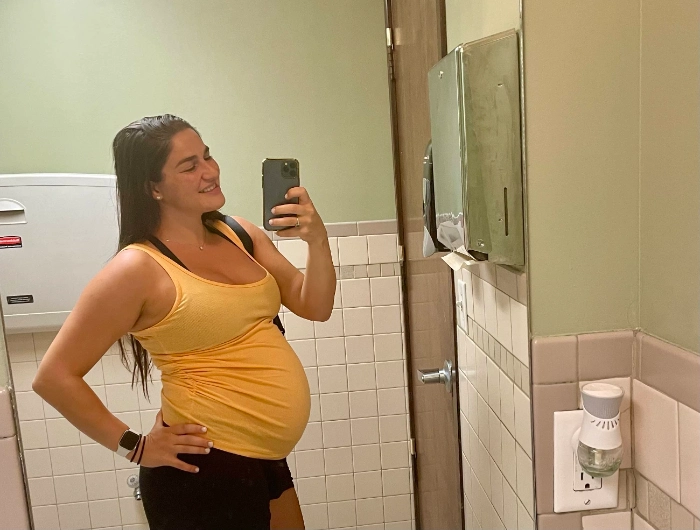A Natural Approach To The Glucose Test During Pregnancy

Hello third trimester, extra baby kicks, and the glucose test during pregnancy.
Pregnancy is magical, but it also comes with a lot of appointments, check-ins, and things to Google at 2am. And sometime between weeks 24 to 28, your provider brings up the glucose test. Traditionally, this means drinking a sweet, colored beverage on an empty stomach and waiting for a blood draw one hour later. But if the thought of chugging that fluorescent drink makes you cringe, you are absolutely not alone.
The good news is that you do have options for the glucose test during pregnancy. Healthier options. Cleaner options. Options that still give your provider the information they need without putting unnecessary ingredients in your body.
Let's break down what this test actually is, what is in the standard glucose drink, and the natural alternatives you can ask your provider about.
What is the Glucose Test?
The purpose of the glucose test during pregnancy is to check if you have gestational diabetes (GD). This is a temporary form of diabetes that can develop due to hormonal shifts and blood sugar levels become elevated.
Gestational diabetes can affect both mama and baby, so it's important to test, but the way the test is done does not have to be a one-size-fits all.
The goal is simply to see how your body processes a measured amount of glucose. It is the amount that matters, not the specific brand-name drink.
What's in the Glucose Drink?
Most providers hand out Glucola, which contains 50, 75, or 100 grams of sugar depending on the test. While the glucose amount is medically necessary, the ingredient list can make a lot of moms raise an eyebrow.
The ingredients will vary depending on the specific drink. However, most have the following concerning ingredients.
Red-Flag Ingredients
food dyes
brominated vegetable oil (BVO)
dextrose from corn (artificial sweetener)
sodium benzonate
A Closer Look
First, there's the food dyes. We've all heard of Red 40, Yellow 5, etc. And we all know they are bad for us. So why do they add food dyes in this drink? To make it look pretty? No, thanks.
Then, the BVO. This substance is banned in California and in many countries. BVO is actually patented as a flame retardant.
Finally, the dextrose. An artificial sweetener that often makes people feel jittery and get a headache.
The big takeaway is that the drink works for glucose testing, but it contains ingredients many of us try to avoid in daily life, let alone during pregnancy.
A Cleaner Option: The Fresh Test
A very popular alternative that more providers now offer is The Fresh Test. It still delivers the required amount of glucose but without the dyes, preservatives, or questionable additives. It is made with glucose, organic lemon flavor, and water. If your provider has not mentioned it, ask. Many practices are willing to switch if requested.
Natural Whole Food Alternatives to The Glucose Test During Pregnancy
Some midwives and more holistic providers skip the drink options altogether and offer whole-food alternatives that match the required carb amount. This gives you the glucose load your body needs for the test but in a way that feels gentler and more nourishing.
The most important part is timing. You must finish eating one hour before your blood draw to ensure accurate results.
Here are some options my midwife offered me. Each option adding up to 50g of carbs.
Option 1 - What I did!
1-2 eggs (0g carbs)
2 slices of bread (30g carbs)
8 oz Orange Juice (20g carbs)
Option 2
1 cup plain yogurt (10g carbs)
1 cup of strawberries or ½ cup of blueberries (10g carbs)
1 medium white potato or 1 small sweet potato (30g carbs)
Option 3
2 slices of bread (30g carbs)
2 tablespoons of peanut butter (7g carbs)
1 tablespoon of strawberry jelly (13g carbs)
These substitutes for the glucose test during pregnancy offer a more gradual release of glucose into the bloodstream. This can help prevent a sharp sugar high and the dreadful sugar crash that follows.
Always check with your provider before choosing this route because not all practices allow it, but many are becoming more flexible.
Keeping Perspective
As with everything, I think it's important to keep things in perspective.
Here's the truth, the sugar drink for the glucose test during pregnancy is probably not going to cause long-term health issues. Sure, it might just leave you not feeling well for a while. But let's not forget, it would be worse to have gestational diabetes go undetected. If the standard drink is the only option available to you, you and your baby will be okay.
Still, it is empowering to know that healthier alternatives exist. We are in our wellness era, the season of reading labels, asking questions, and choosing what feels aligned. Pregnancy is a time when you are extra mindful about what enters your body, and that is a beautiful thing.
So ask about The Fresh Test. Explore whole food alternatives. Advocate for your preferences. Most importantly, trust yourself. You are allowed to make decisions that feel good for you and your baby.
Wellness doesn't have to be perfect. Small changes. Simple swaps. It adds up.
Stay well,
Mich
*This content is for informational purposes only and is not medical advice.


